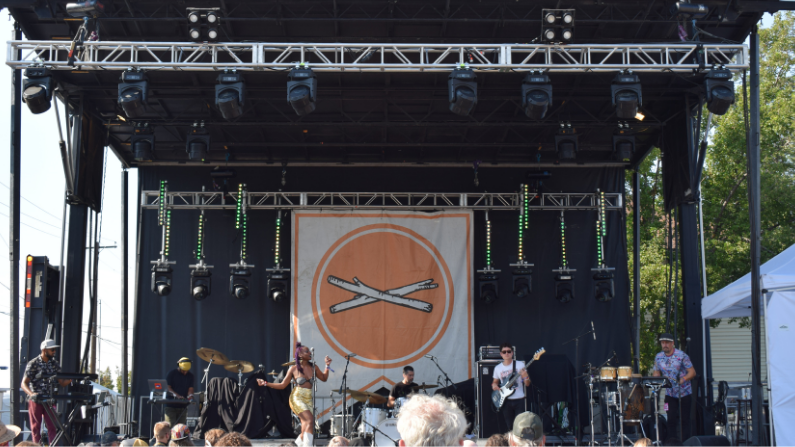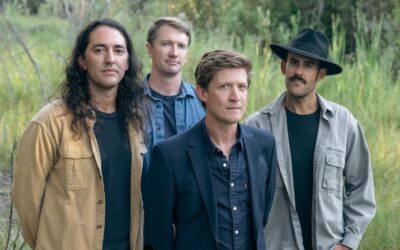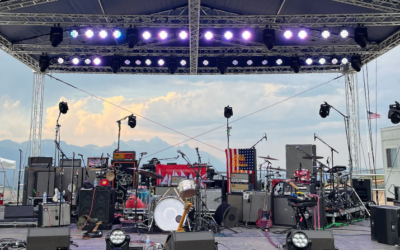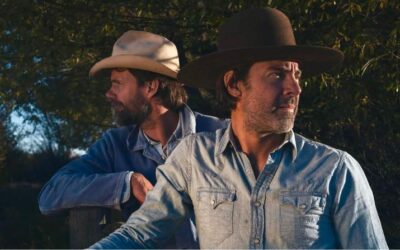The San Francisco-based band The Seshen pulls from a deep well of electronic, R&B and indie rock influences to create thought provoking yet danceable rhythms. The Seshen performed both on The Hideout Stage on Friday night and the main stage on Sunday at the recent Treefort Music Festival in Boise for feverish crowds ready to dance away their quarantine blues.
The band joined KHOL Music Director Jack Catlin on the Saturday between their sets to discuss their unique blend of organic and digital instrumentation, how music helps them cope with the times we’re living in and their focus on constant self-improvement.
Listen above for more and check out a transcript of the interview below.
KnewJack: Alright, this is KnewJack, the music director at KHOL, 89.1 in Jackson, Wyoming, coming to you live from the Treefort Music Festival here in Boise, Idaho. I’m excited to be sitting down here on the front yard of their Airbnb with The Seshen. I’ve got Lalin, Aki, Chris, Mahesh Mirza and Kumar in front of me. Thanks for taking the time to chat with us here at KHOL. So, you pull from a deep well of electronic influences, soul, funk and indie rock. For listeners who are new to your music, can you tell us a little bit about the group and your sound?
Aki Ehara: This is always a difficult question to answer. I think it pulls from all of those genres. I think anything with like a groove, I feel like we’re pretty inspired by. I think we all just want the music to be kind of a reflection of what’s inspiring to us, regardless of genre.
Kumar Butler: So one thing whenever somebody ask me about us, like what we sound like, I always give the the term electronic soul. I don’t really name it as a genre, but like, I feel like that describes who we are, and it kind of describes like the feeling of how we bring soul into the music and how we incorporate, like the electronic side or just like the genre bending side of making soul music.
KnewJack: So, your show last night here at Treefort was amazingly energetic. It seemed like you guys were very excited to be back. How does it feel to be back on stage performing for audiences again?
Lalin St. Juste: It feels so incredible. Each and every one of us, I could feel ourselves radiating with joy and beaming at the audience and each other. I felt on a high and Treefort always brings great audience energy. And so that’s one of the reasons why we love it so much.
Mahesh Rao: You could kind of see it in, you know, all the performers that have been here and all the all the audiences as well. This festival is really cathartic for everyone because, you know. The band that played right before us, Rituals Of Mine, from Sacramento, they hadn’t played for two years since the beginning of COVID, and it was just a really big deal for them and a really big deal for for us and all the performers to be playing in front of, you know, big happy audiences again. And I think it shows on both sides. So we feed off their energy and they feed off ours.
Kumar Butler: Yeah, this is our first show as a band playing together in front of folks outside of the Bay Area. So like, I think that’s like a whole other form of excitement as to like not only play to the hometown, but also like being back on the road. It means a lot.
KnewJack: It’s been a tumultuous couple of years, not just with the pandemic, but protests for racial justice, the presidential elections, debates about vaccination, et cetera. What role has music played for you in processing the times we’re living in?
Lalin St. Juste: I know for myself, music is a refuge that I can come to to heal and get away from the noise of the world and process everything. And so a lot of times when things are really heavy, I’m in my room, you know, singing and trying to figure out how to continue moving forward as a black person in this country. And just like in general, like this world is pretty intense. So I’m just really, always excited to really let it out in the creative process.
Mirza Kopelman: On the racial justice side of it, one thing that pops up so much is how little has changed in all these years because you can listen to music from the 70’s or the 60’s or going all the way back. And the same things are being said now as they were 50 years ago. And you know, I listen to music like old soul or like Bob Marley. Different artists saying the same message of trying to break through and make the change that we need. And there’s something that helps to listen to that music. And then there’s something that also makes me kind of sad to listen to that music and see that we’re not that much farther along in figuring out how to dismantle the system that we live in.
KnewJack: The pandemic and one of the silver linings was give you a lot of time to kind of dig deeper into discovering either older music or new music or different kinds of music. Are there any artists in particular that you got really excited about discovering during the pandemic?
Lalin St. Juste: I feel like during the pandemic is when I discovered SAULT, so that rocked my world. Like, I just went through, they had like three albums at that time they had just put out. So like, that was crazy, super inspiring, still. During the pandemic, I also discovered L’rain and then Liv.e. They’re both really cool, like black women, like making cool experimental music and textures. And then I also really got into just a lot of Brazilian music and just like listening to a lot of Haitian voodoo music and just like letting the house fill with all this different stuff.
Mahesh Rao: At the very beginning of the pandemic, Tame Impala had come out with their album, Slow Rush, and it kind of became my COVID soundtrack. I got into biking and I’d do these long drives to go bike and just play that album over and over again. That whole album was like representative of COVID for me in a way because Kevin Parker was touring on it and that was like the first big show that I had tickets to. They got canceled in San Francisco like the week that all the shutdowns happened and I just went to the rescheduled show. They rescheduled it twice. And it was like a couple of weeks ago at the Chase Center in San Francisco. And it was some good closure because it kind of gives you some hope that like everything is getting a little bit better if it is or if it isn’t. Yeah, I think that album will be one that I associate with COVID for better or for worse forever.
Aki Ehara: I also got into ambient music and listened to a lot of Japanese ambient stuff and would like start and end my day with it. You know, there was so much going on and so much information and really negative information always coming at you that it felt good to just like slow down and get into that. And then right before the pandemic, Kumar and I were going to this monthly party called Smart Bomb that’s in Oakland. And there’s just like, really great hip hop coming out of that scene. So like Overcast and we went to a show for the rapper Mavi and Pink Siifu before things shut down. So I was listening to a lot of that stuff as well and just kind of digging into all the different artists in that circle.
KnewJack: We’re a community radio station based in Jackson Hole, Wyoming, and we love bringing new music from national acts like yourselves to our listeners. Do you guys have a favorite hometown community radio station and what do you love about it?
Mirza Kopelman: I mean, I love KPFA in Berkeley. Their politics are always great. They have some really cool music shows, too. It’s definitely one of my go to stations and I support it.
Aki Ehara: Yeah, I really like KALX. Almost all of us have lived in L.A. at some point, but we all love KCRW and just kind of the various acts they’ve really put on in a big way throughout the years.
KnewJack: What I really like about your song is they feature the unique blend of live and digital instrumentation. How important to you is having that mixture of the two and creating your music?
Aki Ehara: I think it’s really important because, I don’t know, I think having either one opens up such a broader possibility in sound and texture. It seems difficult to not have it that way. I wouldn’t want to have it any other way. And I think just especially as a live band, it is so different to see each individual member performing their parts in front of you rather than someone doing kind of a laptop set or that sort of thing. So even, you know, when I’m in as an audience member, when I can see like bits of production happening on stage, whether it’s like a Radiohead show or Little Dragon or something, just seeing that kind of production level on stage is really special.
Mirza Kopelman: On the flip side, the limitations of your basic live instruments, we like to have the electronic textures that bring so much to the music. I think we couldn’t live with either one, just like all electronic. And then there’s something, some kind of soul that’s missing there. If it was just the live elements, I think we would get kind of bored. We like new sounds. We like new textures. We have to have the mix, I think.
KnewJack: In your bio, Aki says, “As a listener, I’ve always felt that genre takes a backseat to the emotions being conveyed. I let myself follow whatever felt interesting, so it’s kind of a diary of musical inspiration.” I really love that quote as it speaks to the importance of keeping an open mind when digesting music. How does that approach in the pre-production stage, just listening to music, correlate to the final product of an album or a single’s release out into the world?
Aki Ehara: I don’t know, unfortunately or not, but I’ve never really spent a ton of time building a repertoire of songs that I play, so I tend to absorb things a little more passively. You know, I’m not transcribing tunes all the time or anything, so I think I’m just picking out things that resonate with me. I do try to listen to a lot of different kinds of music. I guess as far as the pre-production stage, a lot of it is just finding something that sounds cool and stealing from various places and combining things that are just like, I like what they’re doing. I want to inject a little bit of that into my project. In all the listening I do, it kind of just becomes this amalgamation of the things I love and it’s in there like spitting it back out that it kind of becomes your own.
KnewJack: CYAN, your latest album that came out in 2020, is in your own words, a story about saving yourself. From everything I’ve read, it seemed like a very cathartic album to work through and produce. Can you expand on that for us?
Lalin St. Juste: CYAN is a reflection around like realizing certain aspects of yourself, breaking out of the darkness of sadness and depression and using the ocean as a vehicle for that. Yeah, I think with each project, a lot of the art that I make tends to be very self-reflective around my own personal growth. And so thinking around just what it means to continue to question yourself and look at yourself from different angles. So there’s songs like “Can’t Pretend” and “Faster Than Before” that’s just about like breaking out and change. And so, yeah, it was definitely a very cathartic piece, and I just feel really connected, you know, to this body of work because of that.
KnewJack: And you touched on it but from what I’ve read, you have a significantly deep connection to the ocean. How does that connection, as well as other natural elements up in the Bay Area in general, inform your music?
Lalin St. Juste: I think something happens to you when you’re surrounded by water. We’re driving around and there’s the water right there and and I think I’ve always just had a fascination with water. You know, just because the power that it holds but also like my own lineage and like what it means for my people. And yeah, I love being able to live in a place where I’m surrounded by it and it allows me to be able to go and like reflect and see the reflection of the Moon or the Sun or whatever in those waters and think and write. And being in a place like the bay, you know, you have the redwoods, you have the ocean, you have all of these natural elements that are always coming up in my music because I think, is just in my DNA. And I’m just like so connected to these aspects of this place that we live in. Water is always, always in there somewhere.
KnewJack: What’s the biggest area of growth for you guys from when the band started to where it is today?
Mirza Kopelman: I mean, just in general, everything we do has gotten better because that’s what happens over time when you repeat things, when you play so many shows. You just get better and better at it. When you sit in the studio for hours and hours and hours and hours, you just get so much better at it. So I think we’ve been doing nothing but growing, actually. And that’s, I think, one of the reasons why we’ve been doing this for a long time and we’re still doing it because we’ve been willing to grow together with each other, even in our private lives, and it all keeps us together as a band. The growth that continues to happen.
Aki Ehara: For me, probably production and mixing. It’s like when I listen back to the first album, I still like it and everything, but I’m just like, Wow, I would have mixed this way differently now. Or like, yeah, having more knowledge there is is really nice or just that there’s always further to go.
Kumar Butler: Being somebody that joined the band like soon after it first started was interesting to see from that very, very beginning point up until now because I feel like the sound was changing from the inception, just even to just when I joined. And then from that point, I feel like our sound was a thing that didn’t exist as much in music, like it was still around but it wasn’t as prevalent as it is now. And I think the band has done really well as far as growing from that point and still making music in this way that’s true to us but not like following that change.
KnewJack: So it’s very exciting for me that you guys are part of the Tru Thoughts record label. I feel like it’s a cutting edge musical movement with a diverse cast of very talented characters such as Quantic, Nikitch & Kuna Maze, Anchorsong, WheelUP, Sly 5th Avenue, et cetera. How does it feel to be a part of that family? Can you speak on the collective of musicians involved?
Aki Ehara: Yeah, it’s felt really good and we really love the label owners. We’ve actually stayed at Paul’s house like a couple of times when we’ve gone through England. I think one thing I’ve really enjoyed is, you know, we turn music in that is pretty eclectic and like maybe not everyone would understand but there’s never any kind of push back on anything we’re doing that’s weird. It doesn’t seem like that’s the nature of what they’re trying to do like in that sense. It feels really good to just feel like it is our artistic vision. They’re not asking us for hit singles and stuff like that. So they are an eclectic label but we do fit in in our own way and it’s been fun to work with them.
KnewJack: Yeah, their motto is good music is good music, and you guys, of course, fall into that category. So finally, wrapping up here, what’s next for you guys? I know you have some gigs in the Pacific Northwest. Are you also working on any new music?
Lalin St. Juste: Yeah, we are working on new music, so we’re really excited about that and should have some things to hopefully share or announce in 2022.
KnewJack: Thank you The Seshen for joining us here at KHOL. It’s been a beautiful late afternoon hang here on the front yard of the Airbnb here in Boise, Idaho. You can hear The Seshen’s music on KHOL during our new music mix every weekday 11 a.m. to 2pm, as well as my show 9 a.m. to 11 a.m. Mountain Standard Time. I’m Jack Catlin and this is KHOL Jackson.
Support for this coverage is made possible by the Wyoming Arts Council and the National Endowment for the Arts.





